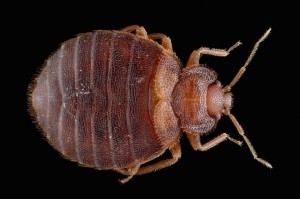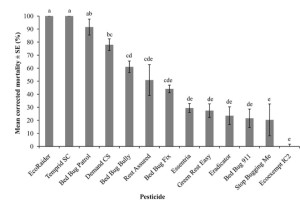By GWEN PEARSON
Female of the bed bug – Cimex lectularius. Scale: bug length ~5 mm. Gilles San Martin
Consumers desperate to eradicate tiny domestic vampires have created a huge market for “natural” bed bug control. Sales are high, as are some of the claims; bogus bed bug products have prompted multiple Federal Trade Commission (FTC) actions for deceptive advertising.
New research put 11 over-the-counter bed bug sprays to the test to see if essential oils can do more than make your bedroom smell nice. The results were… underwhelming.
Potential of Essential Oil-Based Pesticides and Detergents for Bed Bug Control. 2014. N. Singh, C Wang, & R. Cooper. J. Econ. Entomol. 107(6); DOI: http://dx.doi.org/10.1603/EC14328
The products tested contained ingredients for an aromatherapy overdose: cedar, cinnamon, geraniol, clove oil, peppermint, rosemary, lemon grass oil, citronella, and others. Additional ingredients were soap (sodium lauryl sulfate, a foaming agent commonly found in shampoo); salts (potassium sorbate); and 2-Phenethyl propionate, which occurs naturally in peanuts.
Most of the products failed a very simple test: if you sprayed the stuff directly on live bed bugs in a petri dish, would they die? Researchers measured bug deaths after 1, 3, 5, 7, and 10 days to make sure they captured any lingering effects. Two conventional pesticides were included for comparison purposes in the tests: Temprid SC and Demand CS. There also were control bed bugs that got spritzed with water as a mock spray treatment.
Seven of the natural products tested did not manage to kill even ½ (50%) of the bed bugs sprayed, measured by dead bugs 10 days later.
Percentage of bed bugs that died within 10 days after treatment. Only the first two products killed most of the bed bugs–and that was when sprayed directly onto the bugs. Temprid SC is a conventional synthetic pesticide. Singh et. al 2014
Only Temprid SC and EcoRaider killed 100% of the bugs when applied directly. Although Temprid SC, a synthetic pesticide, killed 100% of the bed bugs on the first day, only 88% of bedbugs in the EcoRaider tests had died by the 5th day. None of the compounds tested acted as repellents to bed bugs in climb-up tests, where the bugs had to walk over a treated area.
The second synthetic pesticide, Demand CS, performed poorly in these trials, probably because of resistance to pyrethroid insecticides in the bed bugs tested. It did, however, do better in residual tests; 14 days later Demand CS was still killing on a level with EcoRaider and Temprid SC.
It Might Not Be the Essential Oils, Anyway
Perhaps the most interesting — and confusing — conclusion from this research is that essential oils are probably not what killed the bed bugs. The same active ingredients in EcoRaider and Bed Bug Patrol were also in other products (Bed Bug Fix, Green Rest Easy, and Essentria, for example) that weren’t effective killers. What actually killed the bugs is likely something in the spray formulation.
Adjuvants, wetting agents, spreaders, stabilizers, defoamers, stickers, and solvents are all in these sprays, and might work in tandem with the essential oils by improving penetration into the insect, or slowing detoxification. Those formulations are generally proprietary and secret, so figuring out what works may take a while.
No, Mr. Bug, I Expect You to Die
If you see a bed bug and spray it with EcoRaider, it probably will kill the insect, based on this research. The problem is, you generally don’t see bed bugs. That’s why they are so insidious. Bed bugs are remarkably tiny, flat, and fast. They can live inside the slot of a screw holding your bed-frame together. They might live inside electrical outlets near your bed, or behind photo frames. They can bide their time and wait; bed bugs can go for months without feeding. It’s the bed bugs you can’t see that you should worry about.
As someone who’s written about bogus insecticide products for years, the dismal performance of “green” pest sprays isn’t a shock. Bed bugs offer fertile ground for hucksters in the same way that serious medical conditions invite exploitation of the ill. Both topics involve a lot of anxiety and stress, don’t have easy solutions, and people are willing to pay lots of money to find a solution.
Ecoexempt, the worst performer in these tests, sells for $84/gallon; Stop Bugging Me is $90/gallon. Over-the-counter insecticide foggers are not effective for bed bug control — and are still sold widely for that purpose.
“Natural” pesticides qualify for exemption from the Federal Insecticide, Fungicide and Rodenticide Act (FIFRA). They don’t actually have to provide efficacy data for registration. With an over-loaded regulatory system and a low cost of development, manufacturers can roll out new products quickly, and rake in the profits.
Hopefully the FTC will follow up on this research with additional warnings to get some of these ineffective products off the market. Consumers using these sprays may just give their bed bugs a lovely peppermint scent.
Bed Bugs Resistance to Pesticides
http://www.pctonline.com/pct1012-ineffective-foggers-bed-bugs.aspx



